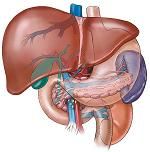Article
Combination Treatment with Sofosbuvir and Ledipasvir Gives Hope for Difficult-to-Treat Patients with Chronic Hepatitis C
Author(s):
Results from the ELECTRON-2 study presented at EASL 2014 show treatment with fixed-dose combo of sofosbuvir and ledipasvir produced sustained virologic response in three cohorts of patients.

Treatment with a fixed-dose combination of sofosbuvir and ledipasvir produced sustained virologic response with good tolerability in three cohorts of patients with hepatitis C.
Edward J. Gane, MD, from Auckland Clinical Studies, in Auckland, New Zealand, presented results from the phase 2 ELECTRON-2 clinical study at the 2014 International Liver Conference in London, UK.
The study examined the safety and efficacy of a fixed-dose combination of the nucleotide polymerase inhibitor sofosbuvir (formerly GS-7977), the NS5A inhibitor ledipasvir (formerly GS-5885), and ribavirin in patients with genotype 1 chronic hepatitis C virus (HCV) infection, including those patients with compensated cirrhosis.
Ledipasvir is administered as a 90 mg once-daily dose; it has picomolar potency against HVC GT1a and GT1b. Sofosbuvir has potent antiviral activity against HCV G1-6 and a high barrier to resistance. The drug is administered orally as a once-daily 400 mg tablet and is approved for treatment of HCV in combination with other agents. Ledipasvir/sofosbuvir can also be administered as a combination tablet (90/400 mg). So far, more than 2,000 patients with HCV have been treated with this combination therapy.
The ledipasvir/sofosbuvir fixed-dose combination is now being evaluated in difficult-to-treat patients who have poor tolerability or efficacy with currently approved antiviral regimens. This includes: a) patients with the genotype 2 chronic hepatitis C (HCV-GT2), previously treated with sofosbuvir regimens who did not achieve a sustained virologic response during the 12-week regimen (SVR12), b) patients with HCV GT decompensated cirrhosis, and c) patients with chronic hepatitis patients with GT3 subgenotype (HCV-GT3) infection.
In ELECTRON-2, 19 HCV patients with prior exposure to sofosbuvir were treated with ledipasvir/sofosbuvir in combination with ribavirin in a 12-week regimen. A second group of 20 HCV patients (CPT class B) were treated with ledipasvir/sofosbuvir (arm 2). A third matched group of treatment-naïve HCV patients were randomised to receive ledipasvir/sofosbuvir (25 patients) or ledipasvir/sofosbuvir in combination with ribavirin (26 patients). All of the 19 patients in the first arm had suffered a relapse during prior treatment with sofosbuvir.
Gane said that “65% of the first group of patients achieved 60% SVR12; 64% of the patients in the second group achieved 60% SVR12; and 100% of patients in group 3 who received ledipasvir/sofosbuvir plus ribavirin achieved SVR12. Overall the 12-week combination therapy was safe and well tolerated with few adverse events. Common adverse events included headache, urinary tract infection (UTI), nausea, fatigue, insomnia, cough, haemolytic anaemia and rash.
Gane said “patients with CPT B cirrhosis who currently have no treatment options achieved SVR12 with ledipasvir/sofosbuvir plus ribavirin. Ledipasvir/sofosbuvir in combination with RBV is now being evaluated in patients with cirrhosis in the SOLAR 1 AND SOLAR 2 clinical trials.”
References
Lawitz E, Poordad FF, Pang PS, et al. Sofosburvir and ledipasvir fixed-doses combination with and without ribavirin in treatment-naïve and previously treated patients with genotype 1 hepatitis C virus infection (LONESTAR): an open-label, randomised, phase 2 trial. Lancet. 2014 Feb 8;383(9916):515-23.
Kowdley KV, Lawitz E, Crespo I, et al. Sofosbuvir with pegylatedinterfern alfa-2a and ribavirin for treatment-naïve patients with hepatitis C genotype-1 infection (ATOMIC): open-label, randomised multicentre phase 2 trial. Lancet. 2013 Jun 15;381(9883):2100-7.





